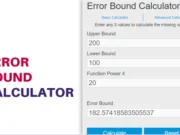What is the Rental Property Calculator Website?
The Rental Property Calculator website is a tool designed to help users estimate the financial performance of rental properties. By inputting details such as purchase price, rental income, expenses, and mortgage details, users can assess key metrics like cash flow, return on investment (ROI), and cap rate. This tool is valuable for property investors, landlords, and real estate professionals seeking to evaluate the profitability and feasibility of potential rental investments.
What is a Rental Property?
A rental property is a real estate asset purchased by an investor or owner to lease to tenants for rental income. This type of property can include single-family homes, multi-family units, commercial spaces, or vacation rentals. The primary objective of owning rental property is to generate consistent income through rent payments, while potentially benefiting from property value appreciation over time. Rental properties can offer a steady cash flow and are often considered a stable investment option in the real estate market.
How to Use the Rental Property Calculator Website
To use the Rental Property Calculator website, enter the relevant details such as purchase price, annual rental income, annual expenses, and mortgage information into the input fields. Click the 'Calculate' button to view the results, which will include estimated cash flow, ROI, and other financial metrics. If you need to start over, click the 'Clear' button to reset all fields. This process allows users to easily evaluate the potential profitability of rental properties.
Property Calculator
FAQs
1. What does ROI mean in rental property investments?
ROI, or Return on Investment, measures the profitability of a rental property. It is calculated by dividing the net income from the property by the total investment cost, then multiplying by 100 to get a percentage. A higher ROI indicates a more profitable investment. This metric helps investors assess whether the rental property is a good financial decision and compare it with other investment opportunities.
2. How is cash flow calculated for rental properties?
Cash flow is calculated by subtracting the total expenses associated with the rental property from the rental income. This includes operating expenses, mortgage payments, and any other costs. Positive cash flow means the property generates more income than expenses, while negative cash flow indicates that expenses exceed income. Managing cash flow is crucial for maintaining the financial health of a rental investment.
3. What are typical expenses for rental properties?
Typical expenses for rental properties include property taxes, insurance, maintenance and repairs, property management fees, utilities (if paid by the landlord), and mortgage payments. Additionally, there may be costs associated with vacancies and legal fees. It’s important to budget for these expenses to accurately assess the profitability of a rental property and ensure it remains a viable investment.
4. How can I increase the ROI of my rental property?
To increase ROI, consider improving the property to attract higher-paying tenants, reducing operating expenses through efficient management, and increasing rental rates in line with market conditions. Additionally, refinancing your mortgage to a lower rate can reduce monthly payments and increase cash flow. Regularly reviewing and adjusting your rental strategy can help maximize returns on your investment.
5. What is a cap rate and how is it calculated?
The capitalization rate (cap rate) is a metric used to evaluate the return on a rental property. It is calculated by dividing the annual net operating income (NOI) by the property’s current market value or purchase price, then multiplying by 100 to express it as a percentage. The cap rate helps investors compare the profitability of different properties and make informed investment decisions.
6. What factors should I consider when setting rental rates?
When setting rental rates, consider factors such as local market conditions, comparable property rents, the property’s location, condition, and amenities. Additionally, analyze demand and supply in the rental market, property maintenance costs, and your target tenant demographic. Setting competitive rental rates ensures your property attracts tenants while covering expenses and generating a reasonable return.
7. How often should I review my rental property’s financial performance?
It’s advisable to review your rental property’s financial performance at least annually. Regular reviews help assess profitability, identify areas for improvement, and adjust strategies as needed. Additionally, monitoring performance quarterly can be beneficial to track changes in expenses, rental income, and market conditions, ensuring your investment remains aligned with your financial goals.
8. What is the importance of property management in rental investments?
Property management is crucial for maintaining the rental property, handling tenant relations, and ensuring smooth operations. Good property management includes tasks such as collecting rent, managing repairs, screening tenants, and enforcing lease agreements. Effective management helps maximize rental income, maintain property value, and minimize vacancies and legal issues, contributing to overall investment success.
9. How can I minimize vacancies in my rental property?
To minimize vacancies, ensure your property is well-maintained, competitively priced, and marketed effectively. Respond promptly to tenant inquiries, offer lease incentives, and maintain good relationships with current tenants to encourage lease renewals. Additionally, screen tenants thoroughly to select reliable renters who are likely to stay longer, reducing turnover and vacancy rates.
10. What should I include in a rental agreement?
A rental agreement should include essential terms such as the rental amount, payment due dates, lease duration, security deposit details, maintenance responsibilities, and rules regarding property use. It should also outline procedures for handling repairs, late payments, and lease termination. A well-drafted agreement protects both parties and helps prevent disputes during the tenancy.
11. How do I handle repairs and maintenance for my rental property?
Repairs and maintenance should be addressed promptly to ensure tenant satisfaction and preserve property value. Establish a system for tenants to report issues, and prioritize urgent repairs. Regularly schedule routine maintenance tasks to prevent larger problems. Consider hiring a property management company or maintenance service for efficient handling of repairs and upkeep, especially if managing multiple properties.
12. Can I use the calculator for commercial rental properties?
While this calculator is primarily designed for residential rental properties, many of the principles and calculations can apply to commercial properties as well. However, commercial real estate often involves additional factors such as different financing structures and lease agreements. It may be beneficial to use specialized calculators or consult with a real estate professional for commercial property analysis.
Related Calculator-












